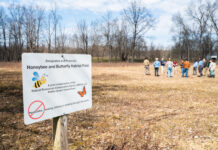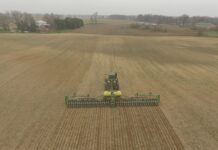State veterinarian Kevin Brightbill urged Pennsylvania’s poultry industry, including backyard bird owners, to step up their biosecurity practices as east Asia and Europe report cases of Highly-Pathogenic Avian Influenza.
Written biosecurity plans are good, but only when acted upon day in and day out, Brightbill said.
Highly Pathogenic Avian Influenza, or HPAI, is reported to be circulating in Bulgaria, Cambodia, China, Czech Republic, Denmark, Germany, Hungary, Ireland, Japan, Kazakhstan, Laos, Netherlands, Poland, Slovakia, Romania, Russia, South Korea, Taiwan, United Kingdom, Ukraine and Vietnam. The disease is known to spread rapidly and be fatal for chickens and turkeys.
The last outbreak in Pennsylvania, H5N2 in 1983, resulted in the loss of more than 17 million chickens, turkeys and guinea fowl to contain and eradicate the disease.
Pennsylvania poultry producers should limit exposure of poultry to wild birds through confinement rearing and other biosecurity measures to reduce the risk of introduction of avian influenza virus from wild birds.
Recent detection by U.S. Department of Agriculture Wildlife Services during routine wild bird surveillance of migratory waterfowl in Washington County detected H4N8 Low Pathogenic North American wild bird lineage virus in a mallard duck, which confirms avian influenza is circulating in Pennsylvania and producers should be on-guard to protect their flocks.
Biosecurity basics for poultry producers include:
- Allow only essential personnel to access your property and your birds. Disinfect any vehicles that enter your farm.
- Don’t lend or borrow equipment from other farms. Bring only cleaned and disinfected items into your bird area.
- Avoid contact with other poultry. If you cannot avoid contact, change clothes and shoes before working with your own birds.
- Wash your hands thoroughly with soap and water before entering your bird area.
- Use footbaths when entering or leaving your bird housing, or wear disposable boot covers.
- Keep poultry separate from wild birds. Don’t let them share water sources or have access to common areas frequented by wild birds.
- Eliminate standing water on your farm and clean up feed spills to avoid attracting wild birds.
For more information about good biosecurity practices visit healthybirds.aphis.usda.gov.
Watch for these signs of illness and immediately report sick or dying birds:
- Sudden increase in bird deaths in your flock
- Sneezing, gasping for air, coughing, and nasal discharge
- Watery and green diarrhea
- Lack of energy and poor appetite
- Drop in egg production or soft- or thin-shelled, misshapen eggs
- Swelling around the eyes, neck, and head
- Purple discoloration of the wattles, comb, and legs
- Ruffled feathers, listlessness, lethargy
Poultry producers with sick or dying birds should immediately report them to Pennsylvania’s state veterinarian by calling 717-772-2852 and press option 1.










